Why Does My Cat Bite Me? Here's Why Your Feline Randomly Attacks You - Newsweek
Cats are a wonderful addition to any household, with the pets providing warmth, love and a mischievous sense of fun.
However, a less welcome trait is when felines attack the humans in their households, seemingly out of the blue.
The good news is that by understanding the psychology of why kitties attempt to sink their teeth into our hands, you can help change this behavior.
Zazie Todd, author of the upcoming book Purr: The Science of Making Your Cat Happy, reassures readers while is never nice when cats attack, "there's plenty you can do."
She told Newsweek: "It involves paying close attention to your cat's body language so that you learn to recognize the signs before it happens, and it also helps to give your cat choices.
"There are several things that could be going on if it seems that your cat is attacking you at random."
Why does your cat bite you? Newsweek asked the experts about why your pet can occasionally cross the line between healthy interaction and aggressive play.
Why Does My Cat Bite Me Unprovoked?
There are at least six reasons why your cat may be biting or attacking you and some of them may be your fault!
Play Mode
Pam Johnson-Bennett, author and Cat Behavior Associates expert, describes felines as "predators stimulated by the scent, sight or sound of potential prey."
Typically, outdoor cats who depend on hunting for survival would engage in a number of attempts each day.
Cats who are safely kept indoors still retain that prey drive but are often left with no way to release that energy.
She told Newsweek: "If a cat isn't receiving adequate stimulation and play opportunities through frequent play opportunities and environmental enrichment, they may finally have to get out all that built up energy toward any detected movement.
"Sometimes, that movement is the cat owner's feet or ankles. This is a sign that the cat needs more constructive and beneficial ways to engage and satisfy the prey drive."
She added a simple solution to this unwanted act of aggression for interactive play sessions with cat toys conducted at least twice daily.
Johnson-Bennett added: "Use a fishing pole-type toy to put a distance between the cat's teeth/claws and the owner's hands. This type of play will allow the cat to fully enjoy what it means to be a hunter."
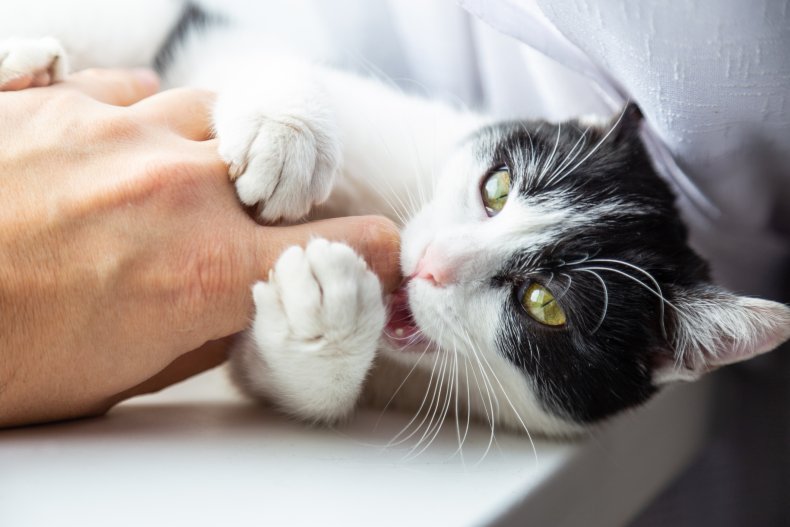
Unwanted Petting
Zazie Todd notes how many cat owners anecdotally observe that felines occasionally will attack when being petted.
She said: "This is a sign that the petting has gone on for too long or was unwanted, and the cat would like you to stop.
"Cats generally prefer shorter petting sessions so when you're stroking your cat, aim to keep it short and sweet.
"Always give your cat the choice of walking away if they prefer not to be stroked.
"It's also best to encourage the cat to come to you to be stroked, rather than you going to them."
Cat expert Celia Haddon adds how some cats simply "do not like being touched in parts of the body" and a felines' body language is misinterpreted by their masters.
She told Newsweek: "Cats sometimes lie down in front of you in what is a friendly gesture. But it does not mean they want a tummy rub. Try it and they will rake you with their claws.
"The parts of the body that cats often do not like being touched are the belly, the backside under the tail, and lower down the back just before the tail. Some also hate their paws being caressed.
"The best place to pet a cat is gently on the cheeks or under the chin. If you pet them in the wrong area they may nip."
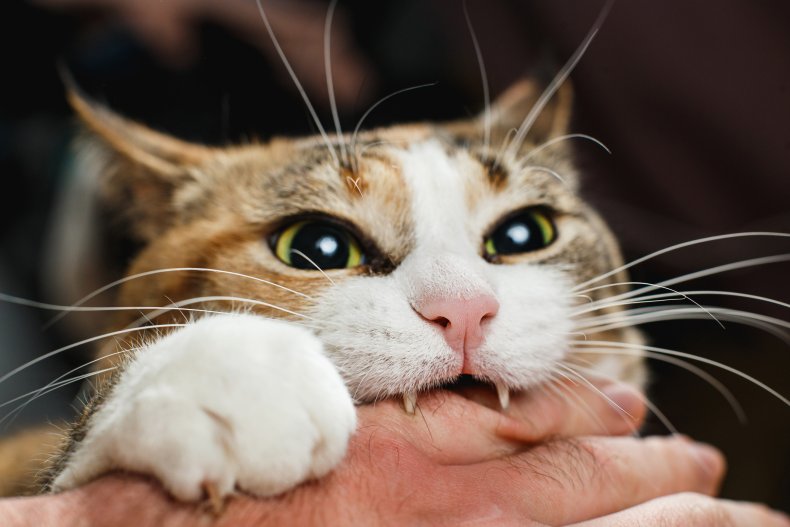
Lack of Human Interaction During Early Ages
Haddon adds cats have, for whatever reason, sometimes had insufficient contact with humans in kittenhood, which can manifest as bad behavior.
She said: "They need to meet humans in the first eight weeks of their lives and if they don't they will be frightened of humans.
"Normally they will run away and hide under the bed. But if you fish them out from under, they will bite or scratch.
"Given a choice between flight and fight they will normally choose flight. But if they can't escape then they will stand and fight.
"The signs that a cat is frightened are ears swivelling down the side of the head, body crouched and tense, feet under the body ready to run, tail low and between the legs."
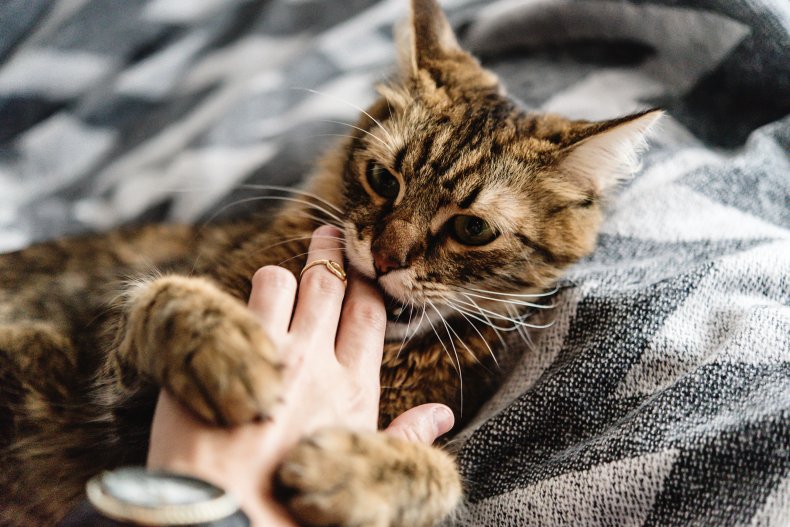
Scaredy Cats
Zazie Todd believes another, more intuitive, possibility for a painful nip on the fingers is "your cat is afraid of you or something you're doing."
She said: "Cats prefer to run and hide when something is stressful, but if that's not possible then they may feel they have to fight.
"So stop what you're doing and figure out how to help your cat. For example, if you have to put them in their carrier to go to the vet, you might be able to gently wrap them in a towel and put them in that way.
"Then in future, you can train your cat to like going in their carrier, and keep the carrier out at all times so that it becomes a place they can relax in."
"You can also speak to your vet about how to make vet visits easier for your cat."
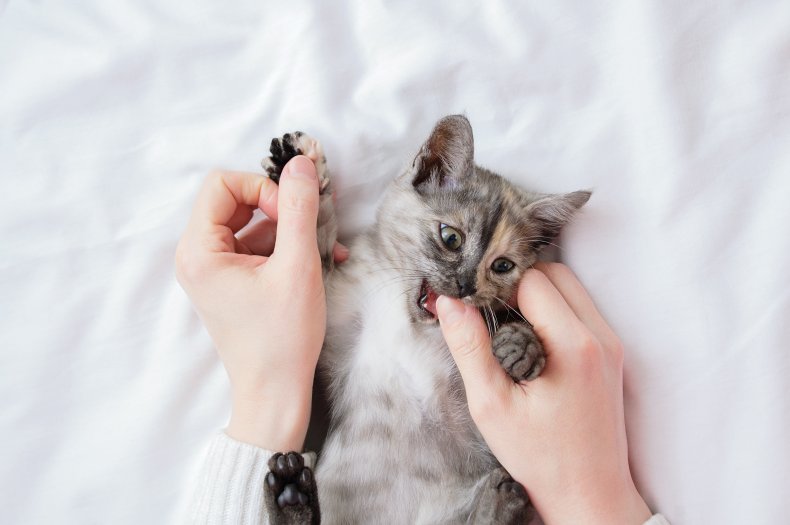
Redirected Aggression
Celia Haddon counsels a sudden attack may not be the fault of the human at all and could just be the case of being in the wrong place at the wrong time.
She said: "They might attack you because they saw another cat through the window, wanted to attack it but when you came close to them, they turned on you.
"Redirected aggression. Or you picked them up during a catfight – always dangerous!
"They are full of rage about something else, but you get in the way.
"Rage and anger in either cats or humans takes time to simmer down. If you must intervene in a catfight use something like the bottom cushion of a sofa and put it between the two bodies. Do not use hands."
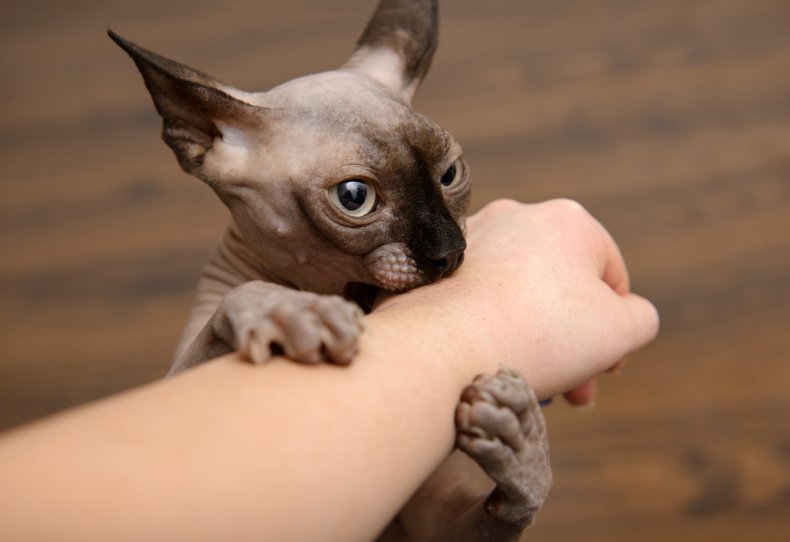
Fear / Old Age
Ashley Moss of Embrace Pet Insurance boasting six years of technician experience in veterinary neurology and emergency medicine believes it is sometimes justified by concern it may be about to come under attack.
She told Newsweek: "When a cat is unprovoked and attacks a human, it is usually because this cat, was in what I like to call, "alert mode" for a perceived threat.
"A perceived threat to our cat is not always identifiable to us, it could be something such as hearing a noise outside or a pen that fell on the floor and is often something that does not signal danger to us but may signal danger to our cat.
"The greater the perceived threat the more focused they become, so much that they may not recognize their loving owner's hand coming for a pet, which in turn leads to them attacking their human's hand."
Haddon suspects old age may be linked to being more fearful about perceived threats than usual.
She said: "If a previously friendly cat starts attacking it may be in pain and be fearful about humans touching it.
"This is particularly likely in an older cat with arthritis or some other disease of old age."
And Pam Johnson-Bennett appears to agree, adding how if the attacks are displays of aggression, "it's important for the cat to have a veterinary check-up because there may be an underlying medical reason for the behavior. This is an important step that shouldn't be overlooked."
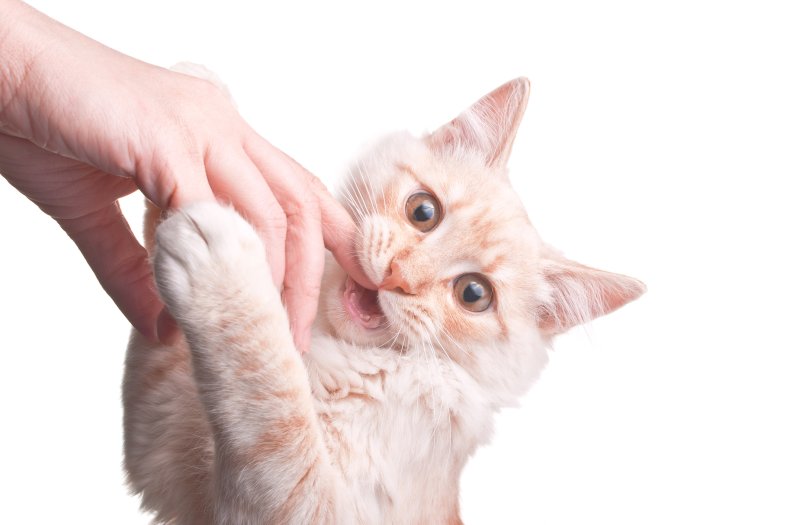
How to Stop My Cat From Biting and Attacking Me
Zazie Todd suggests there are several warning signs to watch for while you're stroking your cat.
She said: "[These] include them staring at your hand, their tail twitching or thrashing, or the skin rippling.
"If you watch your cat's body language, you can learn to stop stroking at the first sign they are finding it too much."
Celia Haddon agrees, adding it is important to be armed with the reasons for attacks, as well as the warning signs.
She said: "Attacks by cats are rarely random. It's just that humans do not see the signs that it is coming.
Zazie Todd also notes it is important to respect your kitty, no matter how annoying and even painful their bizarre behavior can be.
She said: "Never punish your cat because it risks damaging their relationship with you and making them feel stressed or anxious.
"If they seem to be attacking you at random, it's up to you to look for clues and figure out what is going on, then do something to help your cat feel more comfortable."
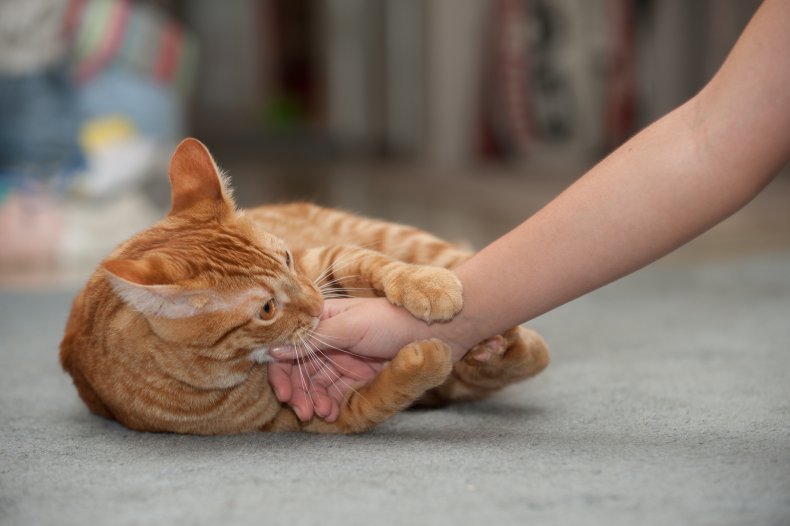



Comments
Post a Comment